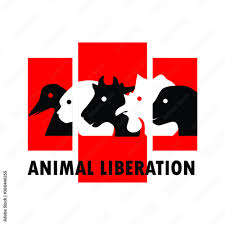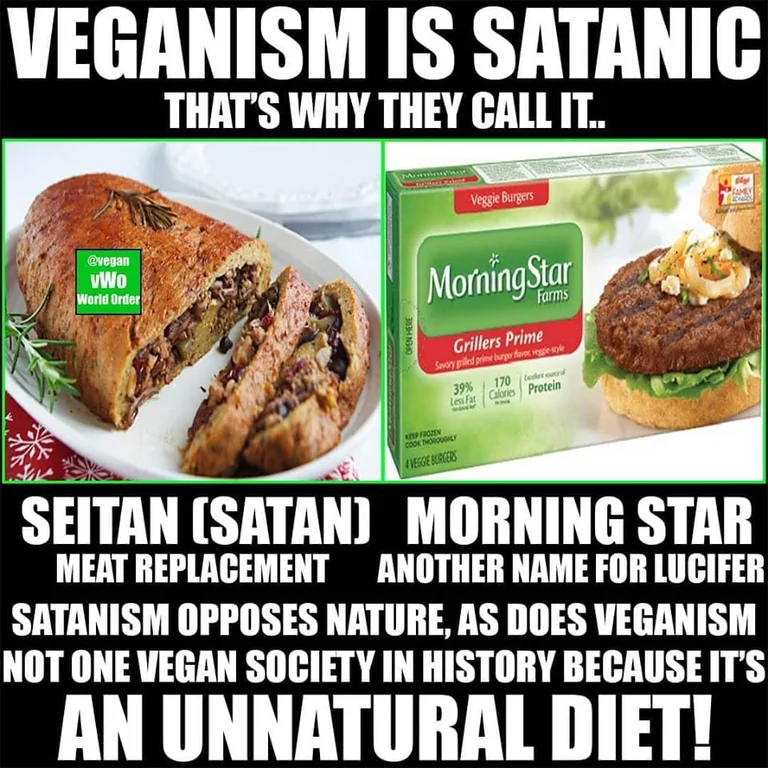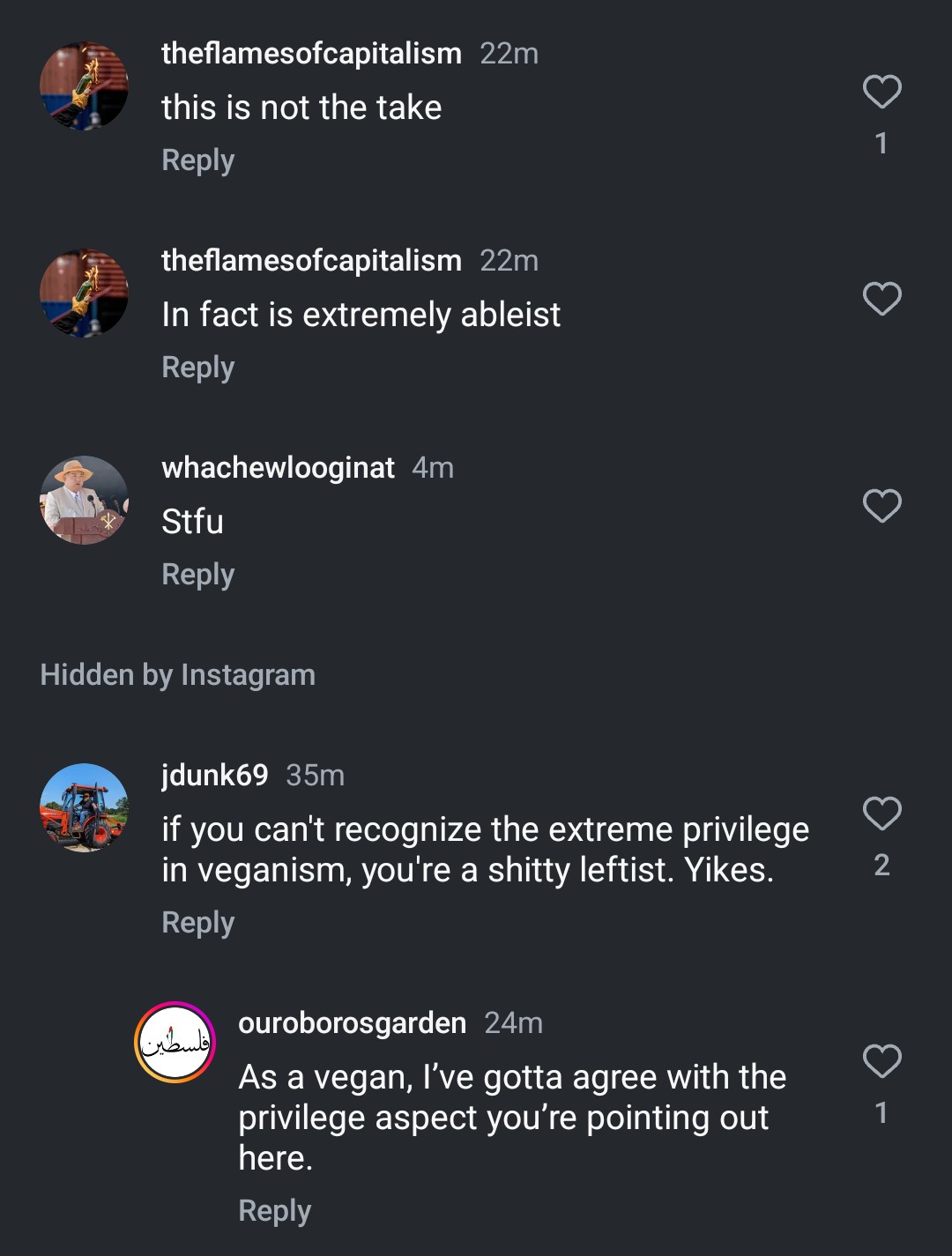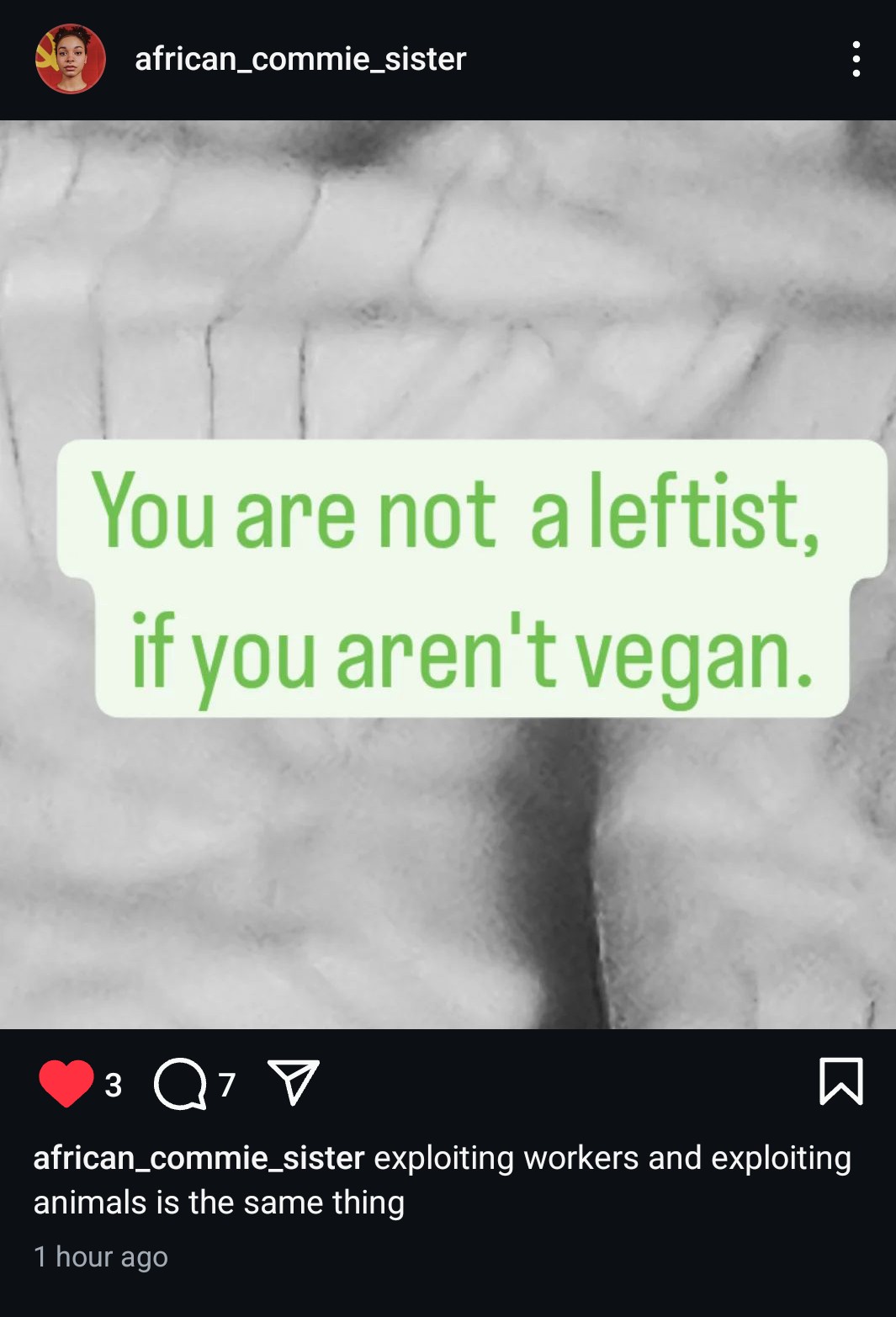This is a shortened version of the original made to enthuse you into reading. It shouldn't replace reading the real thing. Here, I just pasted parts I liked
II. Most animal rights philosophy today is metaphysical.
III. The merit of bourgeois anti-speciesist moral philosophy is that attacks the way speciesists legitimize animal exploitation. Yet it cannot contribute anything of substance on the origin and function of animal exploitation. Instead, it reduces all these questions to abstract, individual acts, views and practices that are treated in complete isolation from the functioning of capitalist society. Such moral philosophy is ahistorical. It is interested in the history of human-animal relations only in terms of the history of ideology, if at all; it can tell us nothing about the social origin and the genesis of speciesist ideology.
IV. In the course of class struggle, the ruling class has degraded nature in general and animals in particular to a means of production at their disposal, secured such hierarchy juristically and stipulated it as universally applicable. For that reason, it is lawful today for man to treat the animal as their property. Legal norms allow the exploitation of animals because they are bourgeois, not just because they are speciesist.
V. Humans are constructed as reasonable, rational and analysing subjects, which are raised above animals who are constructed as unreasonable creatures of nature controlled by their drives and affects. Arguing by means of this dualism is the foundation of the post-structuralist-anti-speciesist critique of power to explain the political dominance of humans over animals, the control of the former over the latter as well as the latter’s exclusion from democracy.
It offers no explanation for what exactly created the ideological dualism of the human and the animal and what mediates it. Whenever anti-authoritarian anti-speciesists allude to this point, their analysis becomes woolly. For this reason, it remains phenomenological, in the end purely formal and, above all, idealist, as it considers mere (wrong) thinking to be the engine of history.
VI. The circle of friends, the butcher, the producer of meat, the animal testing laboratory and its lobbyists – according to those schools, they all must cast off their speciesist thinking for animals to be freed. Social praxis is here above all a question of social consciousness, which is the sum of the consciousnesses of all its separate individuals. Animal exploitation and animal liberation are reduced to a philosophical, epistemological, at best theoretical judicial problem.
VII. Within the capitalist process of production, animals and nature quite literally become a mere resource to exploit.
VIII. Humans, creatures of nature, who have to satisfy natural needs such as food, drink and so forth, hence do not differ categorically but gradually from animals, and this gradual difference is the result of their own politic-economic social praxis.
IX. Speciesist thinking about animals hence is not the basis of animal exploitation, but rather the latter’s ideological reflex. Marco Maurizi got to the heart of this: “We do not exploit animals because we deem them to be inferior, rather, we deem animals to be inferior because we exploit them.”
X. The product re-assumes the form of commodity, which is sold for profit. However, this profit, the accumulation of which is the reason and purpose of capitalist production, does not just fall from the sky. It can be obtained only by exploiting the workers: they work beyond the point at which they have produced a value equivalent to their wage; they thereby produce a surplus that is not at their own but at the capitalists’ disposal.
Therefore, given that there are both exploiters and exploited in capitalist society, it is not the whole human species who exploits animals. Instead, the exploitation of animals and wage labourers first and foremost takes place following the interests and under the direction of the ruling class. Of course, the exploitation of animals and the exploitation of wage labourers differ qualitatively, and the latter do not necessarily act in solidarity with animals just because they are also being oppressed and exploited. Workers in abattoirs even kill animals. But capitalist relations of production do not only rest upon an antagonism between capitalists and the working class, but also between the ruling class and nature as well as animals. The former conducts the industrially organised exploitation of animals and profits substantially from it. Accordingly, as Marx writes, “The view of nature attained under the domination of private property and money is a real contempt for and practical debasement of, nature.” This of course includes animals. To answer the question why not only workers are exploited under capitalism but also animals – if in a particular qualitatively different way – one must examine the position and function that animals inherit in this form of organizing social labour, and hence the specific capitalist form of animal exploitation.
XI. Animals do not immediately take part in the social relations that are characteristic for capitalism as active individuals – they do not purchase or sell anything on the market, not even their labour: when they expend labour in the process of production they do not receive wages in return. Accordingly, animals do not produce surplus value and are not part of the working class. Their exploitation corresponds to what Marx describes as exploitation of nature: by virtue of bourgeois property rights and the economic power at their disposal, the capitalists make a profit from the ruinous dealing with animals and nature. This is not exploitation in the sense of the labour theory of value. Yet Marx also does not limit the notion of exploitation to the production of surplus value. And he certainly does not conclude from the observation that slaves also do not produce surplus value that they are not exploited.
Since they cannot resist in an organized manner, animals are appropriated just like other natural materials as freely available means of production, that is, as instruments of labour (as though they were machines for the production of eggs, milk, meat and so forth) and subjects of labour (leather, meat for further processing and so on). Wage labourers perform the oftentimes violent appropriation in practice. They execute, under capital’s command, the production of surplus value, which in the animal industry encompasses killing and milking as well as performing vivisections and suchlike more. The products that are produced by animals or which they themselves are, are processed further by wage labourers and are finally sold as commodities. The production of profits hence rests not only upon the exploitation of wage labourers, but also on that of animals in particular and of nature in general. For the purpose of maximizing the profits that are realized through the exploitation of animals, capitalists are striving to integrate animals into the process of production as efficiently as possible. Efficiently also means: by abstracting from their qualities, among which is their ability to suffer.
XII. Indeed, one cannot conclude from the critique of political economy that animals would automatically be liberated within a socialist or communist society. Yet, the struggle against the rule of capital and its expropriation are necessary preconditions in order to enable people to collectively cast the decision: we will liberate the animals!
XIII. Above all, the oppressed, exploited classes and animals have the same enemy, who profits from and is responsible for their exploitation while also organizing – in different ways – their oppression: the ruling class. In addition, Marxists need to recognize that due to its damaging social and ecological effects the current extent of animal production is objectively irrational and obstructs social progress.
XIV. This part basically says animal ag is counter-progressive because environment.
XVI. This is the difference between morality and moralism: revolutionary morals understand that a “really human morality which stands above class antagonisms and above any recollection of them becomes possible only at a stage of society which has not only overcome class antagonisms but has even forgotten them in practical life” (Engels).
XVIII. When taking all of this into account, then we also have to conclude: the very indignation we experience in the face of capitalism’s brutality that drives us to a Marxist analysis of society and to resistance is the same one that animal liberationists experience in the face of the suffering of animals. The enemy of animals – capital – is also the enemy of humans. As a Marxist, as an anti-capitalist, one must turn this impulse of solidarity into fuel for one’s life, and understand and acknowledge the objective position of animals within the capitalist process of production, that is, that they belong to those oppressed creatures at whose expense the ruling class accumulates its wealth. The class struggle for the liberation of animals is the struggle for the liberation of the proletariat.



 This comm has limits on what we can talk about btw, such as diet. And I think the whole website has restrictions on recommending specific brands of food? So DM for questions like that, thanks.
This comm has limits on what we can talk about btw, such as diet. And I think the whole website has restrictions on recommending specific brands of food? So DM for questions like that, thanks.






 I love a bean making two different types tonight. But it's great to have such a rich set of options to be vegan in a way that used to be so much more constrained.
I love a bean making two different types tonight. But it's great to have such a rich set of options to be vegan in a way that used to be so much more constrained.




